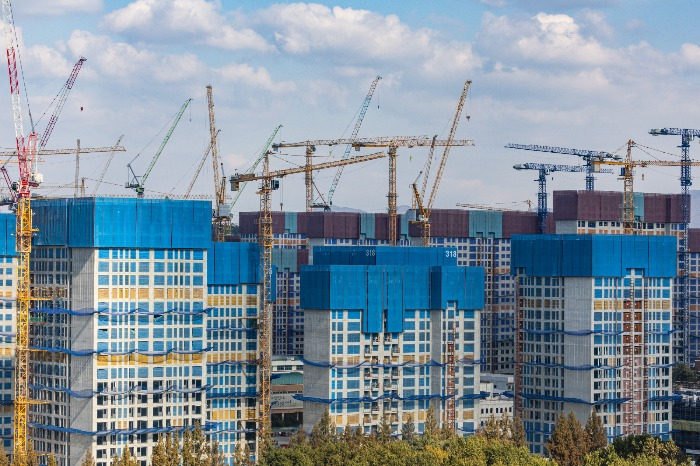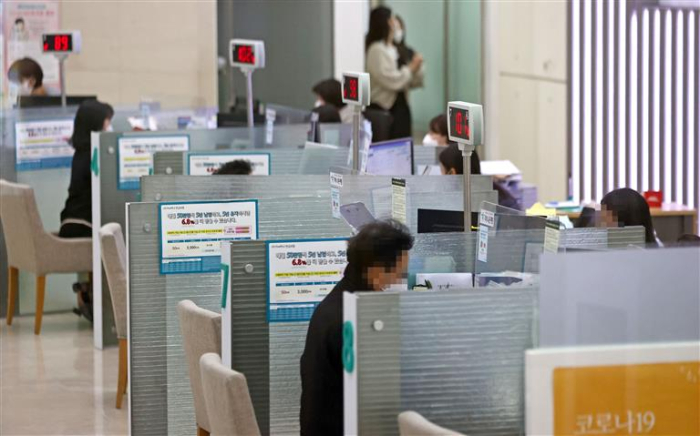-
KOSPI 2577.27 -2.21 -0.09%
-
KOSDAQ 722.52 -7.07 -0.97%
-
KOSPI200 341.49 +0.02 +0.01%
-
USD/KRW 1396 -2.00 0.14%
S.Korea’s project financing exposure reaches $145 bn
Real estate
S.Korea’s project financing exposure reaches $145 bn
Samjong KPMG urges a loosening of rules to attract private equity firms into the project financing market
By
Apr 30, 2024 (Gmt+09:00)
2
Min read
News+

South Korean financial services companies and construction firms are exposed to a combined 200 trillion won ($145 billion) worth of potential risks related to domestic real estate project financing, a big chunk of which is falling due between 2024 and 2025, according to Samjong KPMG.
The amount is equivalent to slightly more than one-tenth of the country’s gross domestic product of $1,007 billion. The consulting firm warned the exposure could create negative domino effects across Asia’s No. 4 economy with little signs of recovery in the domestic real estate market.
By sector, the outstanding balance of real estate project financing for financial services firms was 135.6 trillion won as of the end of 2023, a 46.6% surge compared to three years before, according to Samjong KPMG.
They had been aggressive in lending to the construction sector in search of higher-yielding investments in the low interest era.
The consulting firm released the figures in a report on major issues surrounding the real estate project financing market in South Korea and its prospect.
Brokerage companies’ exposure to real estate projects, or its payment guarantees on construction project loans, reached 16.9 trillion won as of March 22.

Construction companies are exposed to 17.1 trillion won worth of loans related to real estate projects.
Credit lines offered by property developers were also included in calculating the total exposure of 200 trillion won.
“The main cause of real estate project financing risk is the slowing real estate industry due to high interest rates and high prices,” the consulting firm said in the report.
Such risks are highly likely to spread across industries, including non-banking financial services and investment trusts, because they are intricately intertwined through the financial market.
HIGH DEBT-TO-EQUITY RATIOS
Samjong KPMG said Korean construction companies have little room to absorb the default risks of property loans due to their high debt-to-equity ratios, which could trigger a series of bankruptcies in the sector.
Of the country’s 50 leading builders, 14 companies’ gearing ratios exceeded 200% on average in 2023. Two of them posted debt ratios of over 400%.
According to the Ministry of Land, Infrastructure and Transport, 21 construction companies in South Korea defaulted on loans, 33.3% more than the year prior.

In the financial industry, savings banks and brokerage companies are seen as more vulnerable to the prolonged slump in the real estate market.
The balance of their project financing loans was 9.6 trillion won as of the end of 2023 and 6.94% of the loans were in arrears, higher than the average 6.55% in the country.
Samjong KPMG urged construction companies to restructure building projects, including closing down some to improve their financial health.
It advised savings banks and securities companies to put aside reserves to fully cover defaults of bridge loans offered to property developers with higher interest rates than bank loans and sell them down.
“To digest project financing loans, the government needs to offer incentives and loosen the relevant regulations to attract bad loan investment companies and private equity firms in the market,” it noted.
Write to Ik-hwan Kim at lovepen@hankyung.com
Yeonhee Kim edited this article.
More To Read
-
 Corporate restructuringTaeyoung becomes 1st Korean builder in debt workout in decade
Corporate restructuringTaeyoung becomes 1st Korean builder in debt workout in decadeJan 12, 2024 (Gmt+09:00)
-
 Corporate restructuringKorean builders scramble to ease liquidity crunch woes
Corporate restructuringKorean builders scramble to ease liquidity crunch woesJan 05, 2024 (Gmt+09:00)
-
 Corporate bondsKorean firms at risk of credit rating downgrade on Legoland woes
Corporate bondsKorean firms at risk of credit rating downgrade on Legoland woesNov 13, 2022 (Gmt+09:00)
-
 Corporate bondsKorea's $35 bn plan yet to ease Legoland default woes
Corporate bondsKorea's $35 bn plan yet to ease Legoland default woesOct 25, 2022 (Gmt+09:00)
-
Sep 21, 2022 (Gmt+09:00)



